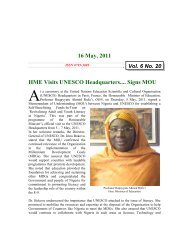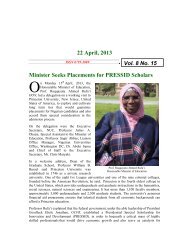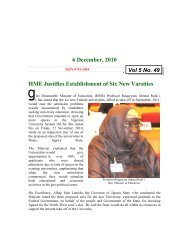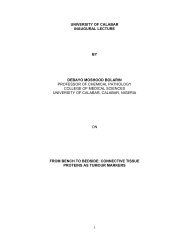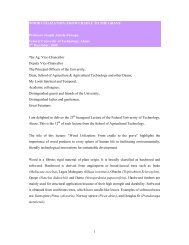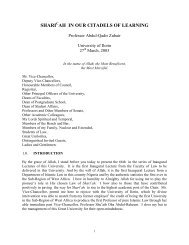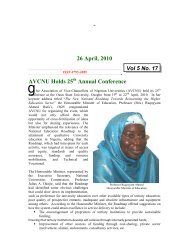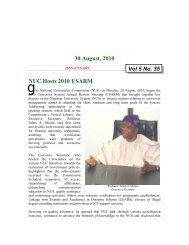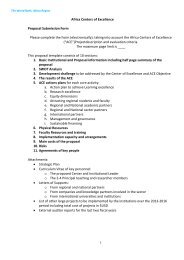THE VARIED ROLES OF SNAILS - National Universities Commission
THE VARIED ROLES OF SNAILS - National Universities Commission
THE VARIED ROLES OF SNAILS - National Universities Commission
You also want an ePaper? Increase the reach of your titles
YUMPU automatically turns print PDFs into web optimized ePapers that Google loves.
other parasitic infections the snail borne worms do not<br />
directly replicate inside the body but rather produce<br />
copious amounts of eggs. It is these eggs, which depending<br />
on the species of worms that are voided into the<br />
environment through sputum, urine or faeces, facilitating<br />
the life cycles of the parasites.<br />
The eggs that fail to exit the body often become trapped in<br />
host tissues and organs and ultimately trigger the<br />
immunopathology associated with the disease.<br />
(b) Fascioliasis<br />
Another name for this disease is liver fluke<br />
disease. This disease is caused by the infection<br />
with the trematode Fasciola (F. hepatica and F.<br />
gigantica). The source of infection is ingestion of<br />
raw aquatic vegetation contaminated with<br />
encysted metacercariae such as lettuce and green<br />
salad, grasses and water crests.<br />
Fasciola passes its life cycle in two different<br />
hosts: sheap, goat and cattle are the definitive<br />
hosts which snails of the genus Lymnaea are the<br />
intermediate hosts. The undifferentiated ovum<br />
develops into a miracidium under moist<br />
conditions in 9 – 15 days at 22 – 25 o C. The<br />
miracidiae which hatch out of the eggs lives for<br />
only eight hours and can move in a film of<br />
moisture on damp pastures. Further development<br />
takes place after free living miracidium<br />
penetrates an amphibious snail. More than 20<br />
species of Lymnaea have been incriminated as<br />
capable of acting as intermediate host for<br />
Fasciola.<br />
80




